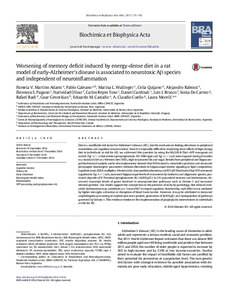Por favor, use este identificador para citar o enlazar este ítem:
https://repositorio.uca.edu.ar/handle/123456789/9289| Título: | Worsening of memory deficit induced by energy-dense diet in a rat model of early-Alzheimer's disease is associated to neurotoxic Aβ species and independent of neuroinflammation | Autor: | Martino Adami, Pamela V. Galeano, Pablo Wallinger, Marina L. Quijano, Celia Rabossi, Alejandro Pagano, Eleonora Samanta Olivar, Natividad Reyes Toso, Carlos F. Cardinali, Daniel Pedro Brusco, Luis I. Do Carmo, Sonia Radi, Rafael Gevorkian, Goar Castaño, Eduardo M. Cuello, A. Claudio Morelli, Laura |
Palabras clave: | ENFERMEDAD DE ALZHEIMER; DIETA; ENFERMEDADES METABOLICAS; HIPERTENSION; MEMORIA; ENFERMEDADES NEURODEGENERATIVAS | Fecha de publicación: | 2016 | Editorial: | Elsevier | Cita: | Martino Adami, P. V., et al. Worsening of memory deficit induced by energy-dense diet in a rat model of early-Alzheimer's disease is associated to neurotoxic Aβ species and independent of neuroinflammation [en línea]. Biochimica et Biophysica Acta - Molecular Basis of Disease. 2016, 1863(3). doi: 10.1016/j.bbadis.2016.12.014. Disponible en: https://repositorio.uca.edu.ar/handle/123456789/9289 | Resumen: | Abstract: Diet is a modifiable risk factor for Alzheimer's disease (AD), but the mechanisms linking alterations in peripheral metabolism and cognition remain unclear. Since it is especially difficult to study long-term effects of high-energy diet in individuals at risk for AD, we addressed this question by using the McGill-R-Thy1-APP transgenic rat model (Tg(+/-)) that mimics presymptomatic AD. Wild-type and Tg(+/-) rats were exposed during 6months to a standard diet or a Western diet (WD), high in saturated fat and sugar. Results from peripheral and hippocampal biochemical analysis and in situ respirometry showed that WD induced a metabolic syndrome and decreased presynaptic bioenergetic parameters without alterations in hippocampal insulin signaling or lipid composition. Cognitive tests, ELISA multiplex, Western blot, immunohistochemistry and RT-qPCR indicated that WD worsened cognition in Tg(+/-) rats, increased hippocampal levels of monomeric Aβ isoforms and oligomeric species, promoted deposits of N-Terminal pyroglutamate-Aβ (AβN3(pE)) in CA1 pyramidal neurons and interneurons, decreased transcript levels of genes involved in neuroprotective pathways such as Sirtuin-1 and increased nitrated proteins. Our results support the concept that in the presence of early Aβ pathology, diet-induced metabolic dysfunctions may contribute as a "second hit" to impair cognition. Noteworthy, such effect is not mediated by higher microglia activation or disruption of blood brain barrier. However, it may be attributed to increased amyloidogenic processing of amyloid precursor protein, generation of AβN3(pE) and dysregulation of pathways governed by Sirtuin-1. This evidence reinforces the implementation of prophylactic interventions in individuals at risk for AD. | URI: | https://repositorio.uca.edu.ar/handle/123456789/9289 | ISSN: | 0925-4439 (en línea) | Disciplina: | MEDICINA | DOI: | 10.1016/j.bbadis.2016.12.014 | Derechos: | Acceso abierto | Fuente: | Biochimica et Biophysica Acta - Molecular Basis of Disease. 2016, 1863(3) |
| Aparece en las colecciones: | Artículos |
Ficheros en este ítem:
| Fichero | Descripción | Tamaño | Formato | |
|---|---|---|---|---|
| worsening-memory-deficit induced.pdf | 3,52 MB | Adobe PDF |  Visualizar/Abrir |
Visualizaciones de página(s)
507
comprobado en 02-mar-2026
Descarga(s)
415
comprobado en 02-mar-2026
Google ScholarTM
Ver en Google Scholar
Altmetric
Altmetric
Este ítem está sujeto a una Licencia Creative Commons

